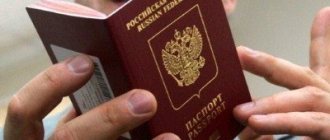Who came across. For example, my son is now registered with his in-laws in a three-room apartment. There are only 4 adults and a son registered there, + I have temporary registration there. The owners are father-in-law, husband and brother. We are planning to take out a one-room apartment with a mortgage. but it turns out that we will rewrite our son into a smaller area. Will they allow it?
Often in life situations arise when it is necessary for one reason or another to change an apartment: to solve the housing problem of a young family or to end conflict situations caused by misunderstanding between two or even three generations.
In this case, there is only one way out - exchanging real estate.
Dear readers! Our articles talk about typical ways to resolve legal issues, but each case is unique.
If you want to find out how to solve your particular problem, please use the online consultant form on the right or call. It's fast and free!
Is it possible to?
Is it possible to exchange housing with minors?
How to exchange real estate with parents? At the moment there are no restrictions associated with such a real estate transaction as exchange. The owner of real estate has the right to dispose of his property at his own discretion (Article 209 of the Russian Federation).
The exchange itself is not particularly difficult, no matter who lives in the room: minors or elderly parents.
If these categories of persons are not the owners, then you need to find suitable options independently or with the help of a real estate agency and competently organize the transaction.
- The owner has the rights to own, use and dispose of his property.
- The owner has the right, at his own discretion, to take any actions in relation to his property that do not contradict the law and other legal acts and do not violate the rights and legally protected interests of other persons, including alienating his property into the ownership of other persons, transferring to them, while remaining the owner, the rights possession, use and disposal of property, pledge property and encumber it in other ways, dispose of it in any other way.
- Possession, use and disposal of land and other natural resources, to the extent that their circulation is permitted by law (Article 129), is carried out by their owner freely, if this does not cause damage to the environment and does not violate the rights and legitimate interests of other persons.
- The owner can transfer his property into trust management to another person (trustee). The transfer of property into trust management does not entail the transfer of ownership rights to the trustee, who is obliged to manage the property in the interests of the owner or a third party specified by him.
The ideal options are those when the owner is one person, or the apartment is shared/joint ownership of the spouses, and their children or elderly parents are simply registered there.
Then the difficulty of the transaction lies only in the correctness of its structure.
But in practice, there are often cases where minors and parents are also co-owners of real estate .
Such situations arise when registering privatization, or when, at the time of purchasing housing, shares are distributed in order to preserve property (for example, there is a possibility that the property may be arrested or seized in order to pay off debts).
If real estate is jointly owned by a number of persons, then the consent of all co-owners (Article 246 of the Civil Code of the Russian Federation). Such consent is drawn up in writing and notarized before being submitted to the Rosreestr authorities.
- The disposal of property in shared ownership is carried out by agreement of all its participants.
- A participant in shared ownership has the right, at his own discretion, to sell, donate, bequeath, pledge his share or dispose of it in any other way, subject to the rules provided for in Article 250 of this Code during its alienation for compensation.
Co-owners have the right of first refusal to purchase a share (Article 250 of the Civil Code of the Russian Federation). This must be taken into account in case of conflict situations in the family (read about the features of exchanging a share in an apartment and the procedure for drawing up a share exchange agreement with relatives and children).
Minor children who have a share do not have full legal capacity ; therefore, their legal representatives are their parents.
Therefore, it is adults who will decide issues related to real estate, without violating their rights. If elderly parents are fully capable , then, apart from agreeing to the transaction, nothing else is required from them.
You can find out whether it is possible to exchange living space by paying additional maternity capital from our article.
The principle of registering a guardian at the place of residence of the ward
The established norms of the current legislation describe in as much detail as possible how registration should be completed in various situations.
In this regard, if a guardian is registered at the place of residence of the ward, he should familiarize himself with how this procedure is carried out in 2020.
Necessary by law
In accordance with the standards specified in Law No. 159-FZ, issued on December 21, 1996, children in their care must be registered in residential premises that are not their main place of residence, if this housing is occupied by the guardian’s family or foster family.
This procedure is carried out on the basis of documents that confirm the fact that guardianship has been established by the specified person. In other words, a ward child must be registered at the residence address of his guardian until he reaches the age of majority.
Even the registration of a ward of a minor child does not require the need to obtain any consent from the owner of the provided property or any other persons having ownership rights to this housing.
Registration procedure
In accordance with the rules established by current legislation, a guardian can register in the apartment that is currently occupied by the child under his care.
Moreover, before submitting the corresponding application for registration to the passport office, it is best for the guardian to study as carefully as possible the conditions stipulated in the drawn up guardianship agreement, and in particular, read the clause establishing the rules and conditions under which the residence and use of the specified real estate.
Having made sure that the norms of the specified document do not limit the possibility of joint residence in the property of the ward, the guardian receives the right to submit an appeal to the authorized guardianship authorities.
The application must clearly indicate the reasons on which the person wants to obtain registration at the residence address of the person under guardianship, and in addition, the same document must contain a request for permission to obtain registration in municipal real estate occupied by the person under guardianship .
After the appropriate response is received from the authorized employees of the guardianship authority, the guardian will need to submit an appeal to the local municipal authority so that government officials give their permission to register registration on the territory of municipal real estate, and also obtain written consent to carry out this operation from every citizen who is currently registered in the specified housing.
After collecting a complete package of all necessary documentation, a corresponding application can be submitted to the passport office in order to register at the place of residence of the child under guardianship.
Among other things, the guardian should not forget that the guardianship authorities monitor quite closely the extent to which the rights of the child under guardianship are respected, and therefore, if any violations are discovered, an unscrupulous citizen can simply be removed from their duties, which leads to accordingly, to subsequent deregistration.
Temporary and permanent registration of a guardian at the place of residence of the ward
Before a child reaches the age of majority, his guardian may be granted registration at his place of residence.
It is worth noting the fact that in this case a simplified procedure for terminating registration is provided, which, first of all, meets the interests of the foster parents.
It is worth noting that permanent registration for guardians is not currently provided.
The key problem with registration of permanent registration at the place of residence is that, in accordance with paragraph 31 of the Rules for registration of registration or deregistration established by Government Decree No. 713, a person can be deregistered only if he is recognized as missing, changes his place of residence, is declared dead, or independently evicts from his occupied housing.
Thus, automatic removal from the permanent registration of a guardian after the child reaches the age of majority is not provided, and therefore he can live at the specified address for an unlimited amount of time.
Moreover, in this case, the child cannot be put on a waiting list for separate housing, since he has the right to use the guardian’s housing.
FAQ
| What is adoption? | Today, this form of raising orphans is the most optimal, since in the process of adopting a child, exactly the same legal relations arise between him and the guardian that are formed after the birth of the child between him and the parents. Adoption is carried out after the relevant application is submitted to the court by the interested parties. |
| How to become a guardian? | Guardianship or guardianship is established over those children who are left without parents for the purpose of their upbringing, maintenance and education. In this case, the guardians are persons appointed by the leadership of the local government, and the duties will be performed absolutely free of charge. Any legal relationship between guardians and children ceases completely after the ward reaches the age of majority. |
| How is a foster family formed? | The formation of a foster family is carried out on the basis of an agreement on the transfer of a child for upbringing to a specific family. This agreement is concluded between adoptive parents and guardianship authorities. |
Attention!
- Due to frequent changes in legislation, information sometimes becomes outdated faster than we can update it on the website.
- All cases are very individual and depend on many factors. Basic information does not guarantee a solution to your specific problems.
That's why FREE expert consultants work for you around the clock!
APPLICATIONS AND CALLS ARE ACCEPTED 24/7 and 7 days a week.
Source: https://1kvartirka.ru/registracija-opekuna-po-mestu-zhitelstva-opekaemogo/
Operation approval
If the child is not the owner of the property or a share in it, but is only registered , then there is no need to coordinate the exchange operation with anyone.
It is necessary to deregister it with the Federal Migration Service in advance and register it elsewhere (for example, with relatives or friends).
At least one of the parents must go through the same procedure with the child , since by law a child cannot live alone without a family.
Methods and options
Exchange (in the literal sense) is now extremely rare, so such transactions are carried out through purchase and sale . It all depends on the initial parameters of the property that needs to be exchanged, and the financial capabilities of the initiators of the exchange transaction.
Obviously, you can’t get two from one living space without an additional payment (read about drawing up an exchange agreement with an additional payment). In addition, you need to take into account the number of people who need to be accommodated. Even people far from the real estate industry know that are in greatest demand .
The difficulty also lies in the fact that you need to try to make an exchange operation at the same time , that is, find a buyer for your living space and the real estate options that you plan to purchase.
Where to begin?
You need to advertise your home for sale. This can be done by contacting a real estate agency , or independently - through specialized websites or printed publications.
When a buyer has been found and has proven the seriousness of his intentions (made an advance or a deposit), you need to start looking for suitable options for purchase . This is done by analogy with finding a buyer for your property - through realtors or on your own.
Required documents
When the entire transaction chain is built, you need to prepare a number of documents (it would be better if you do this in advance):
title documents for the real estate being sold, which indicate on the basis of what event the ownership right arose (sale and purchase agreement, deed of gift, inheritance certificate, etc.), as well as a certificate of ownership (if available);
technical and cadastral passport - which indicate the parameters of the property being sold;
a certificate from the Unified State Register - the owners are listed there;
an extract from the house register (not always required);
permission for the transaction from the guardianship and trusteeship authorities (if among the owners there are minor children and incapacitated parents);
a certificate from the Federal Migration Service stating that all residents of the premises were previously deregistered;
consent to the transaction of the spouse (if the property is jointly acquired), certified by a notary;
consent to the transaction of other co-owners of the property, in the case of shared ownership, also certified by a notary;
the purchase and sale agreement itself;
passports of all participants in the transaction;
receipt of payment of state duty;
receipts confirming the absence of debt on utility bills;
- other documents (at the discretion of the registration authorities).
from the sellers from whom real estate is purchased for resettlement.
Documents for the transaction can be submitted:
List of documents
Free legal consultation
The list of documents for canceling the address registration of a child in an apartment (room, private house) will depend on several factors. Among them, lawyers specializing in housing law most often highlight the following aspects:
- Does the child have a share in the housing from which he needs to be discharged (that is, is he a co-owner of this premises)?
- Is the housing privately owned or is it on the balance sheet of a city, town, or serviced by the corresponding utility service of an enterprise or department?
- Whether or not the child has any of the preferential categories: disabled, orphan, or other.
Read also: Public services: population census
In the first case of the listed cases, in case of voluntary eviction of parents and child (for example, when moving to a new home), for discharge you will need to submit to the FMS authority:
- The original birth certificate of the child (Russian Federation or another country) or his Russian passport (after the minor reaches 14 years of age).
- A written application to the Federal Migration Service on behalf of the child. The document is drawn up in the prescribed form personally by the applicant or his legal representative (parent, guardian, etc.).
In addition to this, the homeowner must have with him:
- an identity document valid on the day of application (passport of a citizen of the Russian Federation, address certificate, temporary residence permit);
- a conclusion issued by the city or district guardianship authority, which confirms the consent of the curators to the discharge of the child;
- original document giving the right to dispose of real estate (private property certificate).
In addition, the applicant will be required to provide the original registration certificate for housing, in which they plan to register the child in the future at a new place of residence, indicating the shares of private property. As an option, you will need to provide an already valid temporary use agreement and information from the guardianship authority that the child’s rights will be respected in the new premises (livability, standard number of square meters, etc.). These standards are prescribed in the Civil and Housing Codes of the Russian Federation.
Option two provides for a situation where the child does not have a share in the house or apartment from which he is being evicted. Subject to the voluntary eviction of the child, the applicant must provide all of the above documents, except for the certificate-conclusion from the guardianship authorities. But this rule does not apply when a child over 14 years of age does not have parents, or when a minor citizen is declared incompetent or has limited physical capabilities.
If a child belongs to a preferential category, has no parents or has health problems, then the minor can be discharged only by decision of the Children's Rights Commission.
Processing times and costs
The processing time and cost will depend on where you are submitting the documents:
- Through a notary – 3 working days; the cost of services consists of a fixed part, the cost of technical work and a percentage of the transaction price (varies from 0.3% to 1%). The fixed part and technical services may be different for each notary.
- Through the office and website of Rosreestr - 10 working days; the amount of state duty will be 2000 rubles; The cost of calling a Rosreestr employee to your home is different in all regions.
- Through the MFC - on average 13-15 working days; You only need to pay the state fee (2000 rubles).
- Delivery times are quite difficult to determine; this method of registering the transfer of property can hardly be called reliable; the cost of Russian Post services depends on the weight of the envelope with documents (300-1000 rubles).
obtain a certificate of ownership at the Rosreestr office or at home by calling an employee of this institution for an additional fee.
Features and nuances
The owner of the living space or share is the child.
In new housing, its share should be no less in area than in the previous one; It is not allowed to move from a comfortable residential premises to a private house “with amenities on the street”; location is taken into account (in particular, moving from city to village is not approved), etc.
There is no official list of reasons for refusing to issue guardianship consent to a transaction. Therefore, citizens often go to court about this.
Exchange of privatized housing. Such deals rarely occur. Direct exchange is mainly practiced between relatives. In accordance with the Civil Code of the Russian Federation, the party to the transaction who received the larger property pays the difference in value in cash to the other party.
Can a guardian sell the ward’s apartment and dispose of his other property?
The law provides for several forms of protection of the rights and interests of children who are left without guardianship.
As a rule, such children have lost their parents, or they do not fulfill their duties. Such failure to comply becomes a reason for deprivation of rights.
Accordingly, the child can no longer live with his parents, and he is removed. In order to ensure a normal upbringing, children are placed under guardianship. Accordingly, guardianship is a form of care for children without parents.
Guardians have certain rights and responsibilities towards the children under their care. In this case, the child may have his own property or receive it through guardianship. Therefore, the powers of guardians in relation to children's property always cause serious disputes. So, can a guardian dispose of the property of the ward?
Differences between edema and adoption
Does a guardian have the right to dispose of the property of the ward? How a child's assets are used and disposed of is largely determined by the guardianship status itself and the individuals involved.
Guardian status should be considered in more detail in comparison with adoption:
- guardianship is not a secret. That is, it is assumed that the child knows that the guardians are not his natural parents. And there is criminal liability for disclosing the secret of adoption. When adopted, the child must be fully integrated into the new family. He must perceive his adoptive parents as his own;
- During guardianship, the child’s personal data does not change. He continues to bear the same surname and first name;
- Guardianship is established on the basis of a decision of the guardianship authority. Meanwhile, adoption is allowed only by judicial act.
Guardianship involves a simpler procedure than adoption. It should be said that it is established for children who have not reached the age of 14 years. As current practice shows, establishing this form of child care is more typical for close relatives.
For example, if parents die, grandparents or siblings of the parents may become the guardian. That is, the child lives in a family of relatives, and it makes no sense to adopt him. Accordingly, he retains his rights, including property rights.
What property is a ward entitled to own?
As stated above, we are talking about children under 14 years of age. Until the specified age, they did not even reach limited legal capacity.
Accordingly, such a child can act as a subject of law only with significant restrictions. At the same time, the law establishes the right of children to own property.
And this has nothing to do with their age. For example, a child may receive real estate by inheritance or as a result of a gift transaction. However, he may not reach the age of 14.
But this circumstance in no way excludes his right to own this or that thing or property. Therefore, those under guardianship retain all their property.
Assets that children may own include:
- real estate . This is the most common type of ward asset. Apartments or part of a house can be acquired as a result of inheritance or otherwise. In any case, the child remains the owner of the property;
- bank deposits . Often parents open a deposit for their child. Funds are gradually accumulating there. Therefore, only the child will be able to manage these funds after reaching full legal capacity at 18 years of age;
- any other movable property . These could be cars, inherited jewelry, equipment, and so on.
The ward has no right to use his property. That is, he can use things, but he does not have the full range of rights of the owner.
For example, the ward does not have the opportunity to sell the specified property, mortgage it, exchange it or donate it. It belongs to him, but he has no right to alienate it.
What rights does a guardian have over the ward’s living space?
So, can a guardian manage the property of an incapacitated person? If the ward has property, then the guardians have one or another relationship with him. Of course, the rights of a guardian to the living space of a legally incompetent person under guardianship have their own specifics.
For example, you need to look after your apartment, pay for utilities, and so on. Only guardians can perform such duties, because the child, due to his early age, is not able to independently take care of the assets that belong to him.
Several conclusions regarding the mode of use of property follow from the provisions of the law. They need to be specified in more detail:
- The main body that monitors compliance with the rights of the child is the guardianship authority. Since he establishes guardianship, he also becomes the supervisory authority. The development of relationships between the family and the child, their property situations - all this is under constant control. The law does not allow arbitrary disposal of a child's assets by guardians. Transactions made by the guardian must be previously agreed upon with the guardianship authorities. Otherwise, the transaction will be declared illegal and all its consequences will be terminated. Accordingly, the guardianship authority gives permission to rent the child’s property, transfer it for free use, and so on. At the same time, at the expense of rent, guardians have the right to compensate for the costs incurred in maintaining the premises and movable property;
- Guardians must take care of the safety of the assets of their wards. At the same time, they will inevitably bear the costs of maintaining such property. Therefore, the law provides for the possibility of compensation for expenses incurred;
- The regime for the alienation of a child's possessions is separately stipulated. This concerns the question of whether a guardian can sell the apartment of a minor child. Any actions that lead to a reduction in the volume of property are completely excluded. That is, it is impossible to sell an apartment to a minor. And the consent of guardianship does not matter. Transactions of sale or gift are excluded. Likewise, exchanging the premises for a smaller one is not allowed;
- If you need to spend part of the child’s money, you must also obtain approval from the guardianship authority. Of course, such expenses must be justified by the needs of the child. It is not allowed to spend them arbitrarily and satisfy one’s own needs at the expense of a minor;
- Can a guardian register in the ward’s apartment? There is a direct ban on transactions where the parties are guardians and the ward. Registration of a guardian also falls under this ban. This prohibition is necessary to prevent abuse of one's rights.
The permission of the guardianship authority is a written document that is issued for a particular transaction.
Thus, the main purpose of the law is to keep the child's assets intact. He must enter adulthood with the same property or acquire more.
Accordingly, the guardian has the right to dispose of the property of the person under guardianship on behalf of the child and to purchase various items and real estate. However, they must be registered in his name.
The guardian acts as a representative in all transactions on behalf of the child. He does not require a notarized power of attorney. A certificate of establishment of guardianship and recognition of this status will be sufficient.
How to obtain permission from the guardianship authority to deal with the property of the ward?
Obtaining such permission is a rather complicated process.
It is important to prove that the actions are aimed at respecting the interests of the child.
They should not be intended for the benefit of the guardians. All funds received from such transactions must be spent in the interests of the child. And such feasibility needs to be proven.
For example, renting out an apartment will provide funds that can be used to pay off debt on utility bills. Leasing for free use can serve to ensure the safety of property, guarantee its functionality and proper care.
Abuse of rights may be grounds for criminal prosecution. Therefore, it is recommended to coordinate all your actions with the relevant authority.
In each case, this or that transaction is discussed separately. If necessary, the guardianship authority may require the provision of written documents. They are designed to confirm the validity of the transaction and its compliance with the interests of the child.
If the guardianship authority accepts the person’s arguments, then a permit is issued. This is a written document. It must indicate which transaction is permitted.
Representatives of the guardianship authority do not participate in the actual execution of the transaction and its execution.
But the document they issue becomes the basis for the transaction. In this case, guardians act as representatives of the interests of the child, and not on their own behalf.
Is it possible to discharge a child into a smaller area?
And therefore, it has all the rights to use the living space - exactly the same as its owner. In this situation, the child can be discharged from the apartment only on the basis of a court decision, and for this the owner will have to draw up a statement of claim. It will be very difficult to justify and carry out the procedure for removing a minor from an apartment with a larger area into a smaller one, since the court may consider this decision a violation of the rights of the minor.
The court may decide to preserve the child's rights to use housing for an indefinite period. Or generally make a decision in favor of the minor and refuse to evict. Dismissing children from living space is a complex and responsible procedure, and it cannot be done without competent and qualified legal assistance.
How to register a child in a smaller area?
168 lawyers are now on the site Hello.
This is the situation. My child and I live in the same apartment (my father’s), but are registered in another. Now there is a need to register where we actually live. But this is a smaller area. I heard that according to the law, a child cannot be placed in “worse” conditions.
Both apartments are privatized. And I have another one-room apartment. Can we be refused to change our registration?
05 September 2020, 19:50, question No. 965977 Maria, St. Petersburg Collapse Victoria Dymova Support employee Pravoved.ru Similar questions have already been considered, try looking here: to the site's lawyers.
Today, September 25, 2020, we answered 642 questions.
Lawyers' answers (1)
- Lawyer, MoscowChat
- 7.8 rating
This is only if the child is the owner of the share, then it is impossible, but if he is simply registered, he can be registered for a smaller area.
Average response time is 14 minutes.
05 September 2020, 19:56
All legal services in Moscow Best price guarantee - we negotiate with lawyers in every city on the best price.
05 September 2020, 19:52 Was the lawyer's answer helpful? + 1 — 0 Collapse Client clarification Thank you very much!
Similar questions
- 23 August 2020, 14:04, question No. 1145411
- September 29, 2020, 12:58, question No. 1392105
- 10 July 2020, 12:46, question No. 1691747
- 07 June 2020, 18:17, question No. 1660786
- October 21, 2020, 15:35, question No. 1014036
See also Pravoved.ru In the mobile application and Telegram, lawyers answer faster and the answer is guaranteed even to a free question!
We are trying! Treat the designer to a cup of coffee, he will be pleased







